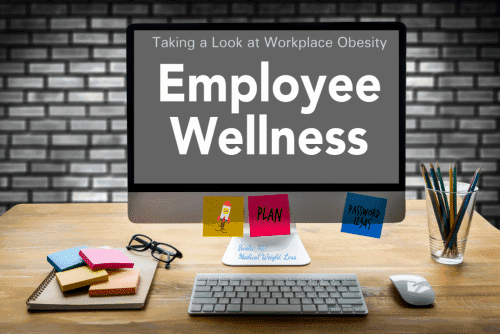Obesity In The Workplace
 Many employers wonder why they should care about obesity, as long as they are profitable companies, making lots of money.
Many employers wonder why they should care about obesity, as long as they are profitable companies, making lots of money.
In this article we are going to look at the facts and statistics, costs and loss of performance and overall concerns rampant obesity puts on the workplace.
It’s a complicated thing to be concerned about – there are a lot of myths about obesity, and a lot of misconceptions that really don’t make much sense. These myths can cause problems not just for the bottom line for the select few, but also in the long run for the global population. Let’s take a look at 4 of the most “weighty concepts” surrounding obesity in the workplace.
(Learn about our Svelte MD Lunch and Learn FREE Education for your team in the workplace)
Obesity in the Workplace Statistics
Obesity is a problem everywhere in the world these days, and unless your company is small in terms of the number of staff it employs, you will not be ‘exempt’ from that problem. The obesity epidemic is a genuine issue. The World Health Organisation say that almost 40 percent of adults are overweight, and 13 percent are obese. Those are figures for 2014, and obesity has more than doubled since 1980.
The trend is for it to get worse and worse, and this should be a concern for parents, employers, and health care professionals. Even if you as an employer are not directly concerned about obesity in your particular office, you should be concerned about the impact that it is having on other offices, your suppliers, etc. It would be discriminatory to make the move to hire only slim employees, and you should be mindful of the point that even a slim employee could gain weight.
Should Employers worry about Obesity? Yes, There is usually a Loss of Productivity due to Obesity
Everyone should be doing their part to help with weight loss. Employers have a valuable role to play in combating obesity, because they have a lot of contact with their employees. Most people spend one third of their week in the workplace – and this means that it has a lot of impact on what they eat and drink.
Even things like how and how long people sit matter. If you, as an employer, can get people up, walking around and moving, then you can help them to get more active. You can have a huge impact on what people eat and drink, and you can have a huge impact on their daily energy expenditure as well.
The workplace can influence a person’s social life, and can even impact on their home life.
The more you support people to lead an active and stress free lifestyle, the better. You can help people with their relationships, their energy, their sleep, and more. People who are stressed are more likely to comfort eat, and that’s not a good thing. People who spend too much time or money on their commute might not be able to eat healthily because they don’t have the resources. This is something that you need to think about carefully.
You should consider things like providing assistance with car pools, providing fresh fruit and healthy meal options at work, allowing families flexitime, and even allowing home working wherever possible. You might not think that these things will have an impact on obesity, but they do.
The workplace can affect the whole family. A child’s weight is determined by the decisions that the family makes. The parents matter, because the children don’t really have the ability to make their own food related decisions. If the workplace is contributing to obesity, then the child will learn from that example, and that’s going to cause problems for the child in later life. If the habits that they learn are bad ones, then they will end up suffering and in a lifelong battle with their weight.
At Svelte MD, our lunch and learn is designed to give you actionable items that you can implement to make the transition to a more active staff possible.
Facts about Obesity in the Workplace
A Myth about Obesity is that it clearly reflects poor character. This is simply not true.
It is not wise to simply judge a person on their appearance. Many assume that obese people are simply ‘lazy’ but that isn’t always the case. While weight is under a person’s control, to lose weight takes knowledge, and given the amount of misinformation out there, it’s hard for a person to lose weight. Fad diets, for example, can lead to weight cycling and problems with keeping weight off even if it is lost.
Often there are many psychological and emotional issues that go unnoticed that have a direct impact on an individual’s ability to lose weight. Without an attempt to understand what is going on beneath the surface, coaching an individual successfully in weight loss can be difficult.
The Real Cost of Obesity
Excess body weight has a huge impact on your overall health. It doesn’t just affect how people look, it also affects their mood, their joint health, their physiological and psychological wellbeing. It can lead to joint pain, fatigue, diabetes, heart diease, cancer, depression, lower productivity and more. It can lead to reduced morale, overall sadness, and serious issues with your heart. For an employer, this stuff matters. Obesity causes absenteeism, and even reduced productivity that can cost employers in the US $73 billion per year. An employer usually pays out $3838 in health costs for a normal weight employee, but obese employees can cost between $4,252 and $8,067. It works out on average at $194 – $222 per employee in weight related costs per employee per extra BMI point.
It is your responsibility as an employer to make sure that you are working to protect the health of your employees. You cannot control their weight, but you should try to help them to live a healthy lifestyle whenever possible. If you don’t do what you can to help with weight related issues, then you will find that your employee’s weight struggles cost you money.
In Japan, the government has tried promoting weight control initiatives. Many insurance companies are offering discounts to people who use fitness trackers and who try to maintain a basic level of physical activity. These are all things that you can do to improve your employee’s overall levels of health and fitness. Support and encouragement tend to work better than punishment, and your employees will appreciate it if you do what you can to help them. Often, they want to make a change for the better but they don’t know how.
